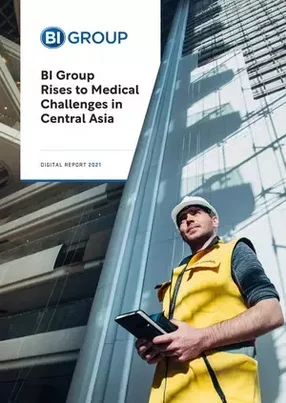The last 18 months have been universally challenging for the construction industry but companies of the size and pedigree of BI Group have weathered it better than most.
The COVID-19 crisis actually presented the group – which has 5,000 employees and is ranked as one of the leading globally – with unexpected opportunities, as it was tasked with building 15 hospitals in two months, spanning a total area of 115,000sqm.
Meeting the urgent health needs has been an overriding priority for its 160-strong procurement team, to the extent that it established a dedicated medical procurement division and even opened its own lab for PCR studies at Nur-Sultan (formerly Astana – the name change was made by Presidential decree in March 2019).
This was on top of procuring items for the group’s 180 projects, covering everything from materials and machinery for housing developments to major stadium projects; last year saw the launch of a 7,000-seat athletic complex in the Kazakhstan capital.
“There was huge demand for medical equipment last year. We did well, as we never broke any agreement terms or schedules,” said Chief Procurement Officer Darkhan Shildebayev. “We believe that medical will be at the heart of construction for the next couple of years for us.”
As part of a charitable campaign to help fight the pandemic, BI Group also donated 1,065 oxygen concentrators to hospitals throughout Kazakhstan.
The BI-Zhuldyzai Foundation, despite the quarantine measures and economic difficulties, has continued its charitable activities and helped 1,253 children with difficult medical diagnoses. In total, 52,603 rehabilitation services were provided in 2020.
Housing drives group growth
This year BI Group is budgeting for growth of 15% in development business, and a slight growth in contracting and projects – and altogether group growth of around 5%, which is respectable given the precarious economic situation.
Housing projects are its main business driver and affordable housing accounts for 10-15% of its portfolio.
The main objective is to make sure it doesn’t face challenges with shortage of materials – a universal predicament facing the industry.
“The pandemic has had a huge impact on our business. We had our suppliers shut down their production lines, and had to deal with border closures – we had materials stuck but it’s much better nowadays.
“We don’t have much production in Kazakhstan, it’s mostly imported from Russia and neighbouring countries – and they’re trying to develop their economies through construction,” he said. “The fastest way to warm up the economy is construction and there will be huge demand for resources and procurement.”
One permanent change will see BI Group set more long-term contracts with its suppliers, and prioritise them, he said.
“We’re going to change how we work with our suppliers, making it easier for them to see what they’ll be working on, so they’ll know the projects in advance – so they can allocate their resources much easier than it used to be.”
He foresees sharp growth in construction, anticipating 9% industry growth, which will create challenges with materials, machinery and manpower.
Building on supplier relationships
BI Group was fortunate in that it had it embraced digital before the pandemic, so making the switch was painless compared with many companies.
Through its Supplier Relationship platform, BI Partners, suppliers can directly interact through the app. Without going into specific terms, he says that “the more you buy, the bigger your discount”. Last year also marked a real estate services turning point, as apartment units could be bought via the BIG App.
Now the plan is to combine all the platforms together, creating one ‘eco-system’ for the whole company. He hopes it will be finalised within a year. In 2020, service specialists processed 147,608 client requests.
“The idea is to connect what we buy, with those who buy it from us,” he said. “We have sufficient amount of information, in construction and sales, but now the idea is to create a picture to understand what this data says to us.”
Out of 10,000 partners, BI Group has 200 main partners, which will be important for the next five years. Suppliers at the top of the list include Danfoss (hydraulic solutions), Kazenergokabel (electrical equipment supplies), GQ Engineering (low current solutions and electrical equipment supplies), MIT (medical innovation technology and medical supplies), Troya, Fenix, Megasmart (all furniture supplies) and Kazintertech (educational equipment supplies).
In another clear example of its attention to detail, BI Group has a special IT department responsible for cybersecurity, which carries out ‘penetration testing’ on an ongoing basis.



